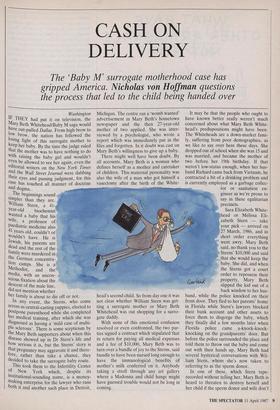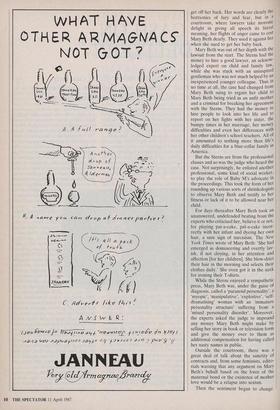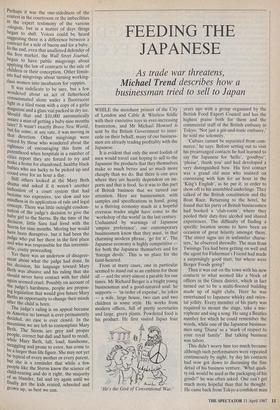CASH ON DELIVERY
The 'Baby M' surrogate motherhood case has the process that led to the child being handed over
Washington IF THEY had put it on television, the Mary Beth Whitehead/Baby M saga, would have out-pulled Dallas. From high brow to low, brow, the nation has followed the losing fight of this surrogate mother to keep her baby. By the time the judge ruled that the mother was to have nothing to do With raising the baby girl and wouldn't even be allowed to see her again, even the editorial writers on the New York Times and the Wall Street Journal were dabbing their eyes and passing judgment, for this case has touched all manner of doctrine and dogma. The beginnings sound simpler than they are. William Stern, a 41- year-old biochemist wanted a baby that his Wife, a professor o paediatric medicine also 41 years old, couldn't or wouldn't have. He 1,, Jewish, his parents are dead and the rest of the family were murdered in the German concentra- tion camps. She is a Methodist, and the media, with an uncon- scious fixation about the descent of the male line, did not mention whether her family is about to die off or not. In any event, the Sterns, who come across as central-casting yuppies, elected to postpone parenthood while she completed her medical training, after which she was diagnosed as having a 'mild case of multi- ple sclerosis'. There is some scepticism by the Mary Beth supporters about when this disease showed up in Dr Stern's life and how serious it is, but the Sterns' story is that pregnancy may aggravate it and there- fore, rather than take a chance, they decided to take the surrogate baby route. This took them to the Infertility Center of New York which, despite its institutional-sounding name, is a money- making enterprise for the lawyer who runs both it and another such place in Detroit, Michigan. The centre ran a 'womb wanted' advertisement in Mary Beth's hometown newspaper and the then 27-year-old mother of two applied. She was inter- viewed by a psychologist, who wrote a report which was immediately put in the files and forgotten. In it doubt was cast on Mary Beth's willingness to give up a baby. There might well Shave been doubt. By all accounts, Mary Beth is a woman who defines herself as a mother and caretaker of children. This maternal personality was also the wife of a man who got himself a vasectomy after the birth of the White- head's second child. So from day one it was not clear whether William Stern was get- ting a surrogate mother or Mary Beth Whitehead was out shopping for a surro- gate daddy. With none of this emotional confusion resolved or even confronted, the two par- ties signed a contract which stipulated that in return for paying all medical expenses and a fee of $10,000, Mary Beth was to turn over a bundle of joy to the Sterns, said bundle to have been nursed long enough to have the immunological benefits of mother's milk conferred on it. Anybody taking a stroll through any art gallery where a Madonna and child hangs might have guessed trouble would not be long in coming. It may be that the people who ought to have known better really weren't much concerned about what Mary Beth White- head's predispositions might have been. The Whiteheads are a down-market fami- ly, suffering from poor demographics, as we like to say over here these days. She dropped out of school when she was 15 and was married, and became the mother of two before her 19th birthday. If that weren't low-status enough, when her hus- band Richard came back from Vietnam, he contracted a bit of a drinking problem and is currently employed as a garbage collec- tor or sanitation en- gineer as we're prone to say in these egalitarian precincts.
Florida police came a-knock-knock- knocking on the grandparents' door. But before the police surrounded the place and told them to throw out the baby and come out with their hands up, Mary Beth had several hysterical conversations with Wil- liam Stern, whom she's now taken to referring to as the sperm donor.
In one of these, which Stern tape- recorded without telling her, Mary Beth is heard to threaten to destroy herself and her child if the sperm donor and wife don't get off her back. Her words are clearly the histrionics of fury and fear, but in .a courtroom, where lawyers take moronic delight in giving all speech its literal meaning, her flights of anger came to cost Mary Beth dearly. They used it against her when she sued to get her baby back. Mary Beth was out of her depth with the lawsuit from the start. The Sterns had the money to hire a good lawyer, an acknow- ledged expert on child and family law, while she was stuck with an uninspired gentleman who was not much helped by an inexperienced younger colleague. Thus in no time at all, the case had changed from Mary Beth suing to regain her child to Mary Beth being tried as an unfit mother and a criminal for breaking her agreement with the Sterns. They had the money to hire people to look into her life and to report on her fights with her sister, the bumpy times in her marriage, her money difficulties and even her differences with her other children's school teachers. All of it amounted to nothing more than life's daily difficulties for a blue-collar family in America.
But the Sterns are from the professional classes and so was the judge who heard the case. Not surprisingly, he enlisted another professional, some kind of social worker, to play the role of Baby M's advocate in the proceedings. This took the form of her rounding up various sorts of shrinkologists to observe Mary Beth and testify to her fitness or lack of it to be allowed near her child.
For days thereafter Mary Beth took an unanswered, undefended beating from the experts who criticised her, believe it or not, for playing pat-a-cake, pat-a-cake incor- rectly with her infant and dyeing her own hair, a sure sign of narcisism. The New York Times wrote of Mary Beth: 'She had emerged as domineering and overtly lav- ish, if not cloying, in her attention and affection [for her children]. She blow-dries their hair in the morning and selects their clothes daily.' She even got it in the neck for ironing their T-shirts.
While the Sterns enjoyed a sympathetic press, Mary Beth was, under the guise of diagnosis, called a 'paranoid personality', a 'myopic', 'manipulative', 'exploitive', 'self- dramatising' woman with an 'immature personality structure' suffering from a 'mixed personality disorder'. Moreover, the experts asked the judge to impound any money Mary Beth might make by selling her story in book or television form and give the money over to them as additional compensation for having called her nasty names in public.
Outside the courtroom, there was a great deal of talk about the sanctity of contracts and, from some feminists, edito- rials warning that any argument on Mary Beth's behalf based on the force of the maternal bond or the existence of mother love would be a relapse into sexism.
Then the sentiment began to change.
Perhaps it was the one-sidedness of the contest in the courtroom or the imbecilities in the expert testimony of the various -ologists, but in a matter of days things began to shift. Voices could be heard suggesting there is a difference between a contract for a side of bacon and for a baby. In the end, even that unalloyed defender of the free market, the Wall Street Journal, began to have public misgivings about applying the law of contracts to the sale of Fhildren or their conception. Other femin- ists had misgivings about turning working- class women into incubators for yuppies. It was indelicate to be sure, but a few wondered about an act of fatherhood consummated alone under a fluorescent light in a tiled room with a copy of a girlie magazine and a glass vial packed in dry ice. Should that and $10,000 automatically assure a man of getting a baby nine months later? It wasn't exactly Brave New World, but for some at any rate, it was moving in that direction. Other misgivings were voiced by those who wondered about the nghtness of encouraging this form of parenthood when hospitals in a number of cities report they are forced to try and make a home for abandoned, healthy black babies who are lucky to be picked up and cooed over for an hour a day. Still others looked at the Mary Beth drama and asked if it weren't another indication of a court system that had become too expensive, too slow and too mindless in its application of rule and legal concept. There was little outright condem- nation of the judge's decision to give the baby girl to the Sterns. By the time of the decision, little Sara had lived with the Sterns for nine months. Moving her would have been disruptive, but it had been the Judge who put her there in the first place and who was responsible for this intermin- able, costly proceeding. Yet there was an undertow of disagree- ment about what the judge had done. In his decision, his language toward Mary Beth was abusive and his ruling that she should never have contact with her child again seemed cruel. Possibly on account of the judge's harshness, people are propos- ing legislation that would give future Mary Beths an opportunity to change their minds after the child is born. The judge's ruling is on appeal because in America no lawsuit is ever permanently decided, no case is ever closed. In the meantime we are left to contemplate Mary Beth. The Sterns are grey and proper People, correct but dull and hard to recall, While Mary Beth, tall, loud, handsome, struggling and prone to error, has come to be a larger than life figure. She may not yet be typical of every mother or every parent, but she is a reminder that while a few People like the Sterns know the science of child-rearing and do it right, the majority of us blunder, fail and try again until we finally get the kids reared, schooled and grown up, as best we can.


























































 Previous page
Previous page